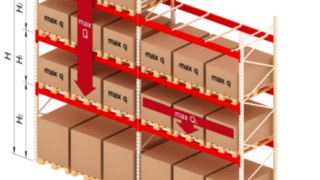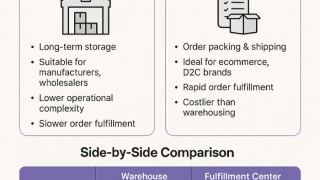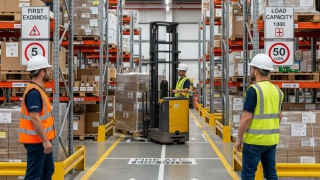Renting vs. Owning a Warehouse: Navigating the Pros and Cons

The decision to renting or buying a warehouse is one of the most significant strategic choices a business can make. It impacts everything from cash flow and operational flexibility to long-term growth and market positioning. There's no one-size-fits-all answer, as the optimal path depends heavily on your company's current financial health, future projections, and operational needs.
This article delves into the intricate details of both options, outlining the distinct advantages and disadvantages of each. We'll explore the financial implications, the level of control gained, the operational agility, and how these factors weigh against each other. By understanding these nuances, you'll be better equipped to make an informed decision that aligns with your business objectives and sets you up for sustainable success.
Understanding Warehouse Rental: The Case for Flexibility and Lower Upfront Costs
Warehouse rental offers a compelling proposition for many businesses, particularly those in their growth phase or industries prone to rapid change. The primary appeal lies in its inherent flexibility and the comparatively lower initial financial outlay.
Pros of Renting a Warehouse:
-
Lower Upfront Costs: This is arguably the biggest advantage. Renting typically requires a security deposit and a few months' rent upfront, which is significantly less than the substantial down payment, closing costs, and other acquisition expenses associated with buying a property. This frees up valuable capital that can be reinvested into core business operations, inventory, marketing, or research and development. For startups or businesses with limited capital, this can be a game-changer.
-
Increased Flexibility: Rental agreements offer unparalleled flexibility in several ways:
-
Scalability: As your business grows or shrinks, you can often adapt your space more easily. Need more space? You can look for a larger rental unit at the end of your lease term or even negotiate for additional units in the same complex. Need less space? You can downsize when your lease expires, avoiding the burden of a large, underutilized asset. This is crucial for businesses with fluctuating demand or those in rapidly evolving markets.
-
Location Mobility: If your target market shifts, supply chains evolve, or you need to relocate for strategic reasons (e.g., closer to a major port or new talent pool), a rental agreement allows for easier relocation once the lease term ends. Selling a property can be a lengthy and complex process, tying up resources.
-
Shorter-Term Commitments: Lease terms can range from a few months to several years, offering varying degrees of commitment. This can be beneficial if your business model is still evolving or if you anticipate significant changes in the near future.
-
-
Reduced Maintenance and Repair Responsibilities: In most warehouse rental agreements, the landlord is responsible for major structural repairs, roof maintenance, HVAC systems, and other capital-intensive upkeep. This reduces your operational burden and unforeseen expenses, allowing you to focus on your core business activities.
-
Predictable Monthly Expenses: Apart from potential rent increases upon lease renewal, your monthly rent payment is a fixed, predictable expense. This simplifies budgeting and financial forecasting, contributing to better financial stability.
-
Access to Prime Locations: Sometimes, the most desirable or strategically important locations are only available for rent, or the cost of buying in those areas is prohibitive. Renting can open doors to prime real estate that might otherwise be out of reach.
Cons of Renting a Warehouse:
-
No Equity Building: Rent payments are purely an expense; they don't contribute to building equity or an asset on your balance sheet. This means you won't benefit from potential property value appreciation, which can be a significant long-term investment advantage of owning.
-
Lack of Control and Customization: As a tenant, you have limited control over the property. Major structural changes, extensive renovations, or significant modifications to suit your specific operational needs often require landlord approval, which may or may not be granted. You might also be restricted in terms of branding or exterior alterations.
-
Rent Increases: Landlords typically include clauses for periodic rent increases, often tied to inflation or market rates. While predictable within the lease term, these increases can impact your long-term operational costs and budgeting, making it harder to forecast expenses far into the future.
-
Lease Renewal Uncertainty: There's always a degree of uncertainty surrounding lease renewals. The landlord might decide not to renew your lease, increase the rent significantly, or repurpose the property, forcing you to relocate. This can disrupt operations and incur relocation costs.
-
Dependence on Landlord: You are dependent on the landlord for property management and maintenance. If the landlord is unresponsive or neglects their duties, it can negatively impact your operations and create frustrations.
-
Restrictions on Subleasing: Many lease agreements have strict clauses regarding subleasing, limiting your ability to recoup costs if you find yourself with excess space before your lease term ends.
Owning a Warehouse: The Appeal of Stability and Asset Building
For established businesses with stable growth patterns and a strong financial footing, buying a warehouse often presents itself as a more attractive long-term strategy. The benefits primarily revolve around financial investment, control, and long-term stability.
Pros of Owning a Warehouse:
-
Equity Building and Investment: When you buy a warehouse, you're investing in a tangible asset. Each mortgage payment contributes to building equity, which can be leveraged for future financing or sold for a profit if the property appreciates in value. Real estate can be a powerful hedge against inflation.
-
Appreciation in Value: Commercial real estate, particularly in strategic locations, often appreciates over time. This appreciation can significantly boost your company's net worth and provide a substantial return on investment in the long run.
-
Full Control and Customization: As the owner, you have complete control over your property. You can customize the layout, undertake renovations, install specialized equipment, and make any structural changes necessary to optimize your operations without needing external approval. This allows for tailored solutions that perfectly fit your business needs.
-
Stability and Predictability: Once your mortgage is fixed, your monthly principal and interest payments remain consistent, providing long-term cost stability that isn't subject to market rent fluctuations. This predictability is invaluable for long-term financial planning.
-
Potential for Rental Income: If your business requires less space in the future, you have the option to rent out excess capacity to other businesses, generating additional income and offsetting your operational costs.
-
Tax Benefits: Property ownership often comes with significant tax advantages, such as deductions for mortgage interest, property taxes, depreciation, and operating expenses. These can lead to substantial savings on your annual tax bill.
-
Business Credibility and Asset: Owning a physical asset like a warehouse can enhance your business's credibility and perceived stability in the eyes of clients, suppliers, and lenders. It signifies a long-term commitment and financial strength.
Cons of Owning a Warehouse:
-
High Upfront Costs: Buying a warehouse involves substantial upfront capital. This includes a significant down payment (often 10-30% of the purchase price), closing costs, legal fees, appraisal fees, inspection fees, and potential renovation costs. These costs can tie up a large portion of a company's available capital.
-
Reduced Financial Flexibility: A significant capital outlay for a property can reduce your financial flexibility for other investments or unexpected business needs. It can also impact your cash flow in the short to medium term.
-
Maintenance and Repair Responsibilities: As the owner, you are solely responsible for all maintenance, repairs, and capital expenditures, including roof replacements, HVAC system overhauls, parking lot repairs, and unforeseen structural issues. These costs can be substantial and unpredictable.
-
Illiquidity: Real estate is an illiquid asset. Selling a warehouse can be a lengthy process, often taking months or even years, depending on market conditions. If you need to quickly downsize or relocate, this lack of liquidity can be a significant disadvantage.
-
Market Risk: Property values can fluctuate. While appreciation is common, there's always a risk of depreciation, especially in volatile economic climates or if the local market declines. Selling at a loss can negate some of the financial benefits.
-
Property Taxes: Property taxes are an ongoing expense that can increase over time, impacting your overall cost of ownership.
-
Operational Burden: Owning a property adds a new layer of operational responsibility, including managing maintenance schedules, dealing with repairs, and ensuring compliance with local building codes and regulations.
Making the Right Decision: Key Considerations
The choice between renting and buying a warehouse is complex and requires careful consideration of several factors:
-
Financial Health and Cash Flow: Do you have sufficient capital for a down payment and ongoing maintenance, or is it better to conserve cash for operations?
-
Long-Term Growth Projections: Is your business experiencing stable, predictable growth, or is it likely to undergo significant changes in size or direction? If growth is uncertain or volatile, flexibility offered by warehouse rental might be more appealing.
-
Market Conditions: What are the current real estate market trends? Is it a buyer's market or a seller's market? Are interest rates favorable for borrowing?
-
Location Stability: Do you anticipate staying in your current location for the foreseeable future, or is there a high probability of needing to relocate?
-
Operational Needs and Customization: Do you require extensive customization or specialized infrastructure that would be difficult or impossible to implement in a leased space?
-
Risk Tolerance: Are you comfortable with the responsibilities and potential risks associated with property ownership, or do you prefer the lower risk profile of renting?
-
Tax Implications: Consult with a financial advisor to understand the specific tax benefits and liabilities associated with both options for your business.
Conclusion: A Strategic Choice for Your Business Future
Both renting and buying a warehouse have their distinct merits and drawbacks. Warehouse rental provides immediate flexibility, lower upfront costs, and reduced maintenance burdens, making it ideal for dynamic businesses or those with limited capital. Conversely, buying offers long-term stability, asset building, complete control, and potential tax advantages, appealing to established companies with predictable growth and a desire for a tangible investment.
Ultimately, the best decision hinges on a thorough analysis of your company's unique circumstances, financial capabilities, and strategic vision. By carefully weighing the pros and cons, considering your long-term goals, and perhaps consulting with real estate and financial professionals, you can make a choice that not only provides the necessary operational space but also contributes significantly to your business's enduring success.
_0x70_d59.png)



